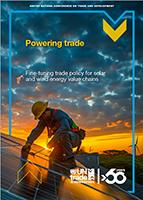
In our race against global warming, every fraction of a degree matters.
Renewable energy has the power to decouple our prosperity from the CO2 emissions that fuel global warming. Moreover, it has the potential to bring power to more than 680 million people living without electricity – and reduce the poverty that implies.
To minimize dependency on fossil fuels, we must expand our capacity to produce renewable energy everywhere. Trade in renewable energy goods must grow faster than it has done over the last decade.
Although solar energy use has increased 37-fold and wind energy 6-fold since 2010, they still accounted for only 5% of global energy consumption in 2022.
We must reassess whether tariffs and other trade measures support or hinder the expansion of solar and wind energy technologies worldwide.
Trade costs along these value chains remain high, making their technologies less affordable and limiting industrialization opportunities. Developing countries’ average tariffs on green energy goods range from 2.5% in Asia and Oceania to 7.1% in Africa, with non-tariff measures adding further costs.
Most developing countries are slipping into traditional trade patterns, exporting raw materials for solar and wind energy technologies while importing intermediate and finished products.
Better trade policy can help save the fractions of a degree we sorely need.
Trade policy is key to reducing barriers and providing the right incentives to expand solar and wind energy technologies across the world.
Areas of opportunity:
- Lowering trade costs on intermediate goods could boost green energy industries, especially in Africa, where tariffs on intermediates can reach up to 8.1%, compared to 4.1% in Asia and Oceania.
- Reducing border costs could foster intra-regional trade in Africa and Latin America, where regional producers face up to four times higher non-tariff border costs than competitors from outside the region.
- Re-evaluating trade defence measures to seek mutual solutions before imposing duties could boost growth in renewable energy value chains, particularly in Asia, which has seen a rise in temporary trade defence measures.
We must shift from the trade policy we have to the trade policy we need.
What can we do?
- Re-evaluate trade policy to strike a better balance between fiscal concerns, the imperatives of energy transition and universal energy access.
- Boost value addition through raw material processing and assembly of solar and wind energy technologies to drive structural transformation and integrate developing countries into global value chains.
- Harness South-South trade and regional integration to strengthen developing countries' participation in renewable energy value chains.


